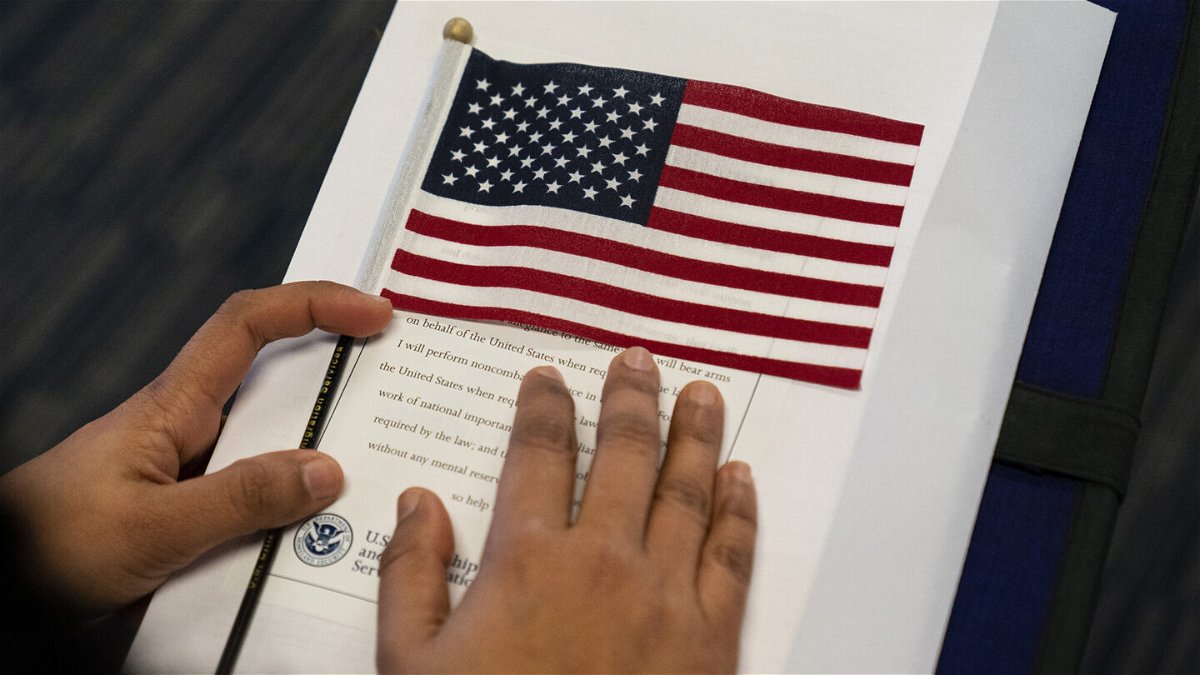‘Quite disruptive’: Months-long processing delays leave people out of work amid nationwide labor shortage

Months-long processing delays leave people out of work amid nationwide labor shortage. This image is from a naturalization ceremony
By Priscilla Alvarez, CNN
Dayana Vera de Aponte had locked in her holiday plans after nearly two years of uncertainty fueled by the coronavirus pandemic, but then the unexpected happened: She lost her job because of an unprecedented US government backlog.
Vera de Aponte, a registered behavior technician for special needs children in Florida, had to walk away from her job this month when her work permit that allows her to legally work in the United States lapsed. Her family has since adjusted their holiday plans, including no longer flying in her husband’s mother, over financial concerns.
“I had to talk to my daughter about the situation. … It’s not in my hands. It’s frustrating, and how do I explain that to her? I can’t buy her Christmas gifts because I’m afraid to spend money,” Vera de Aponte, who’s seeking political asylum in the US, told CNN in Spanish.
Vera de Aponte is one of thousands of immigrants who have lost their jobs — or are on the cusp of losing them — due to bureaucratic delays. US companies already reeling from a worker shortage are now facing the challenge of employees falling out of jobs because their work permits haven’t been renewed on time by the federal government.
An IT company lost five employees this year because their permission to work hadn’t been renewed, leaving them unable to legally work in the United States, according to Leon Fresco, an immigration attorney representing the company. The business, which has roughly 1,000 employees, declined to be named over privacy concerns.
While three of those employees have since obtained their renewals, the incident is emblematic of an issue dogging companies nationwide. “There are huge concerns just generally out there that this is going to keep happening,” Fresco said.
The limited supply of workers has already hampered US companies and it’s at risk of being exacerbated by immigrants unable to keep jobs because they can’t legally work until their permits are renewed. US Citizenship and Immigration Services, which adjudicates and approves work permits, says there’s an unprecedented backlog of 1.4 million work permit applications pending, including initial applications and renewals.
USCIS didn’t have a breakdown of how many of those permits have lapsed because of the backlog, but an agency official told CNN they’ve been hearing from those affected about the problem.
“We’re hearing from companies. We’re hearing from non-profits. We’re hearing from hospitals. And we’re hearing directly from the individuals affected,” the official said. “We’re very aware of the problem from all the way to the top of the agency and the department.”
Some immigrants, including asylum seekers, are allowed to work in the US while their cases are pending — a process that often takes years to complete — and they’re required to renew those permits on a regular basis.
But without those renewals granted, work permits are lapsing, leaving employers no choice but to terminate workers even during a worker shortage.
“The severity of the labor shortage is unprecedented,” said Gad Levanon, vice president of labor markets at The Conference Board, a business membership think tank. “When the labor shortage is so severe, any additional factor that is pulling away people from the labor market is more noticeable.”
The National Association of Business Economics found that nearly half (47%) of respondents to its recent Business Conditions Survey reported a shortage of skilled workers in the third quarter, up from 32% reporting shortages in the second quarter of the year.
“If the labor market was normal, then it would be easier for these companies to replace the ones that lost a work permit,” Levanon added. “Now, finding a qualified worker to replace is much more difficult.”
The months-long delays in renewing work permits has been “disruptive” for companies, said Jon Baselice, vice president of immigration policy at the US Chamber of Commerce, who has frequently heard from companies concerned about processing issues.
“It’s been quite disruptive,” he said. “You’re talking about a situation where a company can’t retain an employee at least in the short term because of lack of paperwork.”
For those employees, the wait for what’s otherwise routine paperwork means putting off plans and fretting over family finances.
Abelardo Rios, a telecommunications field technician residing in Florida, was suspended from his job last week. Rios, who’s seeking political asylum in the US, submitted his application for a renewal in February, three months before his work permit expired. He’s still waiting.
“We don’t have any benefits, no medical insurance. They put the position on hold, but my family doesn’t have benefits right now,” Rios told CNN in Spanish.
One of the most frustrating parts of the ordeal for Rios, who is the sole provider for his wife and 17-year-old daughter, is that he doesn’t have the option to find another job. He can’t work until his renewal request is granted, as it’s been many times before.
In recent weeks, the Asylum Seekers Advocacy Project has received hundreds of inquiries from people who say their work permits have expired or are on the cusp of expiring, according to Leidy Perez-Davis, policy director at the Asylum Seekers Advocacy Project. They include doctors and specialists who attended to patients at the height of the coronavirus pandemic, engineers and long-haul truck drivers, among others.
The Asylum Seekers Advocacy Project, along with the American Immigration Council and Lakin & Wille LLP, filed a lawsuit this month challenging the “unreasonable delays” in renewing work authorizations for asylum seekers. Vera de Aponte is a named plaintiff in the ASAP lawsuit.
A work permit for an asylum seeker is usually valid for two years. Applicants can apply for renewal while their asylum application is pending. If they file before the permit expires, they can receive an automatic 180-day extension of their current permit. But processing, in some cases, is extending beyond that time frame, leaving asylum seekers in limbo.
USCIS, an agency within the Department of Homeland Security, has been facing enormous backlogs across the board due to the coronavirus pandemic and, an official argued, poor management under the previous administration that in part resulted in a million cases spanning categories that were unopened in January.
Since then, the Biden administration has been chipping away at the various backlogs at USCIS through policy changes, paying overtime, and trying to bring on more personnel, the official said. But while USCIS is trying to streamline operations to resolve for delays, it’s also doing so at a time when the agency is working to provide work permits to tens of thousands of Afghan evacuees, stressing already overwhelmed resources.
“We are very focused on the human consequences of people losing their ability to work when that’s something they have no legal reason why they shouldn’t be eligible, and so that’s why we are focused on fixing it,” the official said.
Heghine Muradyan, a doctor in California who attended to hundreds of patients during the Covid-19 pandemic, lost her job in October when her work permit didn’t come in on time. It was approved this week, but she’s still waiting for the permit to get back to work. Muradyan, an asylum seeker who’s also a named plaintiff in the ASAP lawsuit, spent the last several weeks worried she’d lose her license to practice medicine if she didn’t return to work soon.
The uncertainty of what comes next still looms over others.
Biraj Nepal, a software engineer, gets a frequent warning from human resources that his work permit will expire in January, a reminder that he’s on the cusp of losing his job.
“We feel this country is our home,” said Nepal, who has a 4-year-old daughter and a baby on the way. “But we’re living in constant fear and worries because we don’t know what will happen to us tomorrow.”
The-CNN-Wire
™ & © 2021 Cable News Network, Inc., a WarnerMedia Company. All rights reserved.



